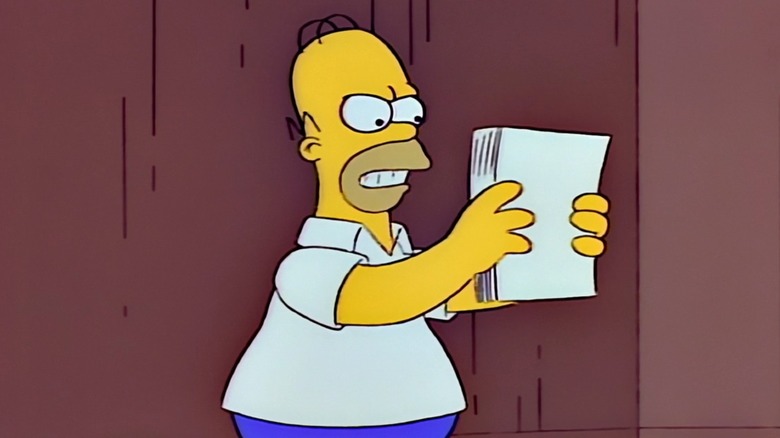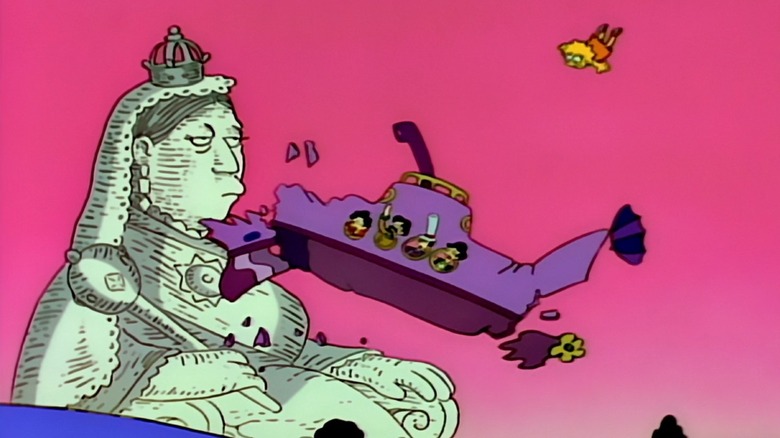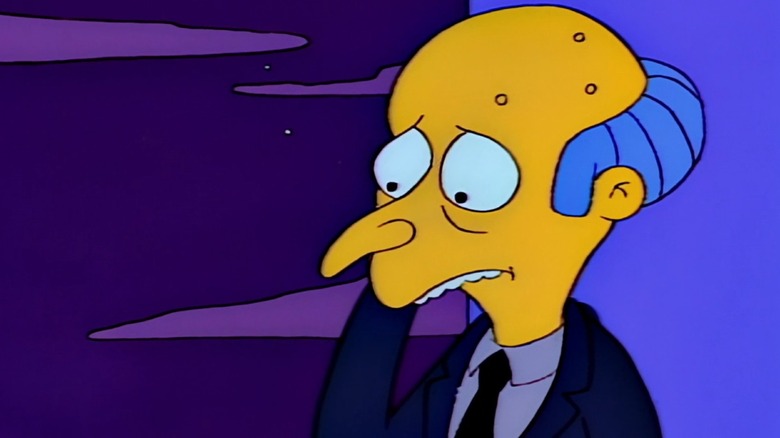Homer Simpson Joins UK Workers On Strike, Because Lisa Needs Braces
This week, months of growing industrial action in the United Kingdom culminated in what has been dubbed "Walkout Wednesday." Half a million workers — including teachers, civil servants, rail workers, bus drivers, Border Force officials, and university staff — were on strike over pay and conditions, with thousands marching in cities across the country to demand action from the government. And Homer Simpson was on strike with them.
Just like America, reruns of "The Simpsons" have been a mainstay of British broadcast television for a long time, with Channel 4 currently airing episodes at 6pm on weekdays. And Wednesday's episode, by sheer coincidence (according to Channel 4), was "The Simpsons" season 4, episode 17, "Last Exit to Springfield."
In the episode, Homer becomes president of the International Brotherhood of Jazz Dancers, Pastry Chefs, and Nuclear Technicians, and leads his fellow nuclear power plant workers to strike after Mr. Burns removes the dental plan from the union contract. The timing is particularly poor since the family has just learned that Lisa needs braces, and without a dental plan she will be stuck with a grotesque scaffolding of steel and elastic bands. The episode gets in numerous jokes about union corruption and links to organized crime, but overall, it has a clear pro-worker bent. Mr. Burns eventually accepts that he can't run the plant without its workers, and agrees to restore the dental plan.
Why is the UK on strike?
If you're out of the loop on British news, here's what you missed: everything is f***ed. Global factors like Russia's invasion of Ukraine, the COVID-19 pandemic, and rising inflation are partly to blame, but the U.K. has been left in a uniquely bad position to weather those storms due to a decade of austerity measures, the impact of Brexit, and the Conservative government's efforts to privatize any public service that isn't nailed down. The National Health Service (NHS), which is particularly firmly nailed down, has been a primary target for privatization by way of gradual dismantling. NHS nurse salaries have fallen by at least 20% in real terms since 2010, creating a vicious cycle of nurses quitting and NHS trusts being unable to recruit enough replacements.
Nurses are among the workers walking out, voting to strike for the first time in the Royal College of Nursing's 106-year history. But the struggles of the NHS are tangled up with a much larger machine of broken infrastructure. Cuts to social care have turned hospital wards into de facto care homes, creating a shortage of beds that has turned ambulances into de facto overflow wards. The resulting delays have led to people dying during the hours-long wait for an ambulance, with up to 500 excess deaths every week as a result of the strain on emergency care.
Meanwhile, postal worker strikes have left letters and parcels to pile up outside depots, where they're chewed on by rats and foxes. Rocketing energy prices and food inflation have left many families facing a "heat or eat" dilemma. Rising interest rates have led to rent increases even as the housing market stagnates. Public transport is a mess. People are cold, hungry, and miserable. And Lisa needs braces.
They sing without flunjers, capdabblers and smendlers!
It might have been pure accident that "Last Exit to Springfield" aired on the day of the biggest walkout in over a decade, but Homer Simpson's solidarity was nonetheless appreciated, with Brits praising the timing on social media. Even if you take away its current political relevance, "Last Exit to Springfield" is an excellent episode of Classic "Simpsons," featuring gems like Grandpa Simpson's stories that don't go anywhere, Mr. Burns' thousand monkeys working at a thousand typewriters, and Don Homer.
It's also an uplifting episode for those workers on strike — both those who have just begun industrial action, and those who have been organizing strike days for months. Currently, the government's main response to the strikes has been to pass an anti-strike bill, allowing employers to sue unions and sack workers who go on strike. For good measure, they have also passed a bill curbing the right to protest (in the name of public order, of course). Even as the number of workers on strike continues to rise, along with public support for the unions, Prime Minister Rishi Sunak still refuses to negotiate over public sector pay.
But at the end of "Last Exit to Springfield," even the malevolent, penny-pinching Mr. Burns realizes that he lacks any leverage to end the nuclear plant strike. Homer cannot be bought (mainly because he mistakes Mr. Burns' bribery euphemisms for chat-up lines). The 1930s strike breakers prove ineffective. Even cutting off Springfield's power supply fails to make the workers put down their picket signs. Mr. Burns ultimately comes to the negotiating table, and Lisa gets her braces. This particular "Simpsons" rerun was a welcome reminder of the power of workers, united.
Now do "Classical Gas."


